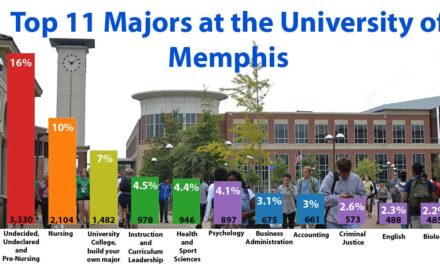 So, how many jobs have been created during Memphis Mayor A C Wharton’s two years in office?
So, how many jobs have been created during Memphis Mayor A C Wharton’s two years in office?
His television ad says 10,000. Channel 3 TV’s “truth test” says 7,320.
The number of jobs created in the past year exceeds 15,000 jobs at least. In this regard, the Wharton campaign is modest in its claims.
The Greater Memphis Chamber said that the actual number of total jobs – both direct and indirect – is 15,707. But even that number requires explanation and is probably low.
Jobs Are Jobs
The 7,320 number used by WREG-TV is taken from the Chamber’s tally, which adds that its economist concluded that there are also 8,387 indirect jobs. It’s this economic fact of life that makes the Electrolux deal in particular so exciting. It will create 1,250 direct jobs and 2,000 indirect jobs by companies that want to be near the manufacturing plant or will serve it.
In other words, the total number of jobs created in past two years – and only within Memphis instead of the regional job numbers released by previous city mayors – is even more than the 10,000 jobs being used by Mayor Wharton in his campaign literature and TV ads. The kicker is that it’s also larger than the numbers compiled by the Chamber.
That’s because the Chamber tracks specific projects, not all jobs created inside Memphis. The 15,707 jobs created in the past two years come from 56 companies. It does not include the mom and pop businesses and the neighborhood-based businesses that have added employees or started up as a result of the burst of optimism that is bubbling up in Memphis.
Channel 3 netted out the new jobs with jobs lost in the past two years – 5,542 – and concluded that only 1,718 net new jobs were created in the Wharton term so far. Again, that ignores the indirect jobs and regardless, it only accounts for the 56 projects that the Chamber worked on.
The Turnaround
Put another way, our truth test here says that the Wharton campaign team – headed up by Deidre Malone and Michael Hooks Jr. who understand full well the risks of using inaccurate facts in campaign ads – are right when they replied to our questions that “more than 10,000 jobs” have been created in the past two years.
Here’s the thing. Even if we used Channel 3’s numbers, the fact that Memphis had a net gain in jobs in the wake of a jobless recovery and looming recessionary repeat is impressive. We’ve written often about the high hurdles Memphis is facing economically and that it will be a long journey back to economic health, but the fact that after losing more than 35,000 jobs in the first nine years of the last decade of the 21st century (an average of 1.5 jobs a day), there is any net gain is surprising.
We would have celebrated if we reduced the negative trend and eroded the job loss trend line, but the fact that we ended up in the black on the jobs ledger is nothing short of remarkable (considering what we were expecting). For this, everyone involved deserve to bragging rights.
We know that we’ve been critical about our economic development policies and Memphis’ overreliance on tax freezes, so we want to acknowledge when the ED folks and the Wharton Administration get it completely right.
Paying to Play
To top off the good news, the Department of Commerce last week released a report that showed that in the wake of the recession, the GDP for our region grew faster than Atlanta’s, another hopeful sign. It seems that there are some positive signs but success will take an awful lot of the right decisions being made in coming years. As we have said many times before, Memphis has no margin for error.
One of those right decisions was the decision to do whatever it took to land the Electrolux deal. We were the first to report that the multi-national company left Quebec despite receiving incentives and there was our concern that in attracting the plant, we were competing with Mexico, which portends to a difficult future if we don’t get serious about creating a workforce that can compete in a knowledge economy.
The only thing harder than finding business prospects the size of Electrolux are the negotiations to seal the deals. It’s nearly impossible for local economic development officials not to feel that they are negotiating against themselves. Because of it, there’s often little to do but err on the upside of incentives. Faced with an economy that was tanking, we think that the determination to close the deal is understandable.
Foursquare
First, the jobs are located in the core city where there is existing infrastructure that is already paid for and where the inner city needs the economic boost.
Second, these are manufacturing jobs, which continue to be the gold standard for cities like ours without a deep knowledge economy. There’s little argument that they are much more preferable than our regular diet of warehouse and distribution jobs.
Third, there is the potential for these plants to give us a stronger position in the increasingly important export economy. The Administration’s goal is to double U.S. exports in the next five years to support and create U.S. jobs. In the past year, exports have outperformed the economy overall, but exports as a policy for our region has not been a widely pursued strategy for economic growth.
Finally, it’s no small matter than the majority of the Electrolux incentives is paid by state government. We know that there are people who complain that we pay those taxes too, but it’s worth remembering that Shelby County residents pay about 20% of the total amount, and if we weren’t getting this state funding for Electrolux, 80% of it would end up in other parts of Tennessee paying for things there.
Walking and Chewing Gum at the Same Time
Getting the state to up its investment, which has always been minimal here, is no small thing and we agree with the Chamber’s Mark Herbison that this too is worth celebrating. That’s not to say that we should go into these new relationships with rose-colored glasses but it’s certainly worth the risks to jump start our economy when cities everywhere are working hard to create jobs.
Mayor Wharton has gotten some heat on talk radio about the incentives, but it’s worth remembering that great cities do many things at the same time. They can recruit new business while investing in neighborhoods, improving arts and culture, and most of all, investing in the quality of life projects (our favorite: Memphis Art Park) that are pivotal to jobs growth in the first place.
It’s a lesson that we just now seem to be learning.




I concur with your upbeat assessment of the Memphis economy, and in some real sense our progress should not be compared to other cities. We should set our own measures of progress and define who we are.
However, the Memphis metropolitan area with its 8 counties is in competition with 365 other metropolitan areas for a slice of the national economic pie.
Bruce Katz of the Brookings Institute reports that 84% of the U.S. population lives in metropolitan areas, which produce 91% of the national gross domestic product [GDP] – the total value of goods and services produced.
While Memphis ranks 41st in metropolitan population, it ranked only 192nd in GDP growth rate (2009-2010) according to the Commerce Department report you cite.
We understand and agree. But we’re hard-pressed to see where any regionalism project or program in our region has accrued to Memphis’ benefit.
The really good news is that next to San Antonio, we have the highest percentage of regional residents living in our the hub city. Then again, Shelby County has about 75% of all regional residents, which should mean that we could apply regional principles and philosophies in our own county and drive regional growth and issues. But we’d have to convince the other cities in Shelby County that Memphis’ future is indeed their future.
Job creation–almost any job creation–in this day and time is good. It would be better if it could be done without placing unfair tax burdens on poor and working class households, but, unfortunately, in our trickle-down, supply-side, Reaganomics-happy economic environment, that’s simply not going to happen. The Chamber of Commerce will make sure of it.
That being said, I’m surprised that SCM is so big on the indirect/induced employment aspect. Verifiable, reliable, peer-reviewed, quantitative studies have repeatedly shown that induced employment figures are more often than not overblown, exaggerated, and/or just flat-out made-up.
Not to play Debbie Downer, but I’ll be incredibly surprised if Eletrolux upholds its pledge on the 1250 jobs; I don’t ever expect it to create the kind of indirect employment it promises. Heck, even Electrolux itself is doing the best it can to lower any and all expectations; regardless, Electrolux’s pledges are on paper only since the IDB and state made sure that Electrolux will face no real repercussions for failing to live up to those pledges.
I can only wish that the Chamber would focus as much attention on helping create homegrown, sustainable companies as it does on luring sketchy firms such as Electrolux. I’ll continue to place my faith in EmergeMemphis and the Renaissance Business Center.